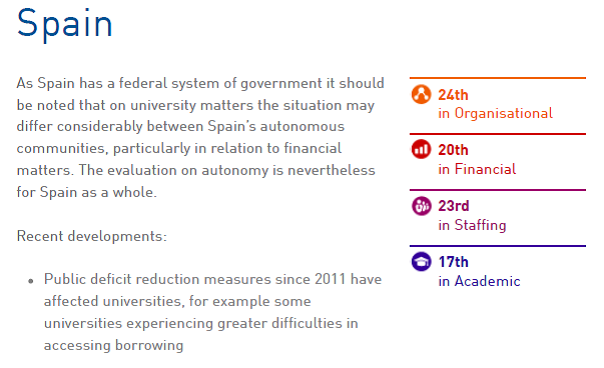University autonomy in Europe
Una de las discusiones más importantes en torno a la Universidad es la que tiene que ver la Autonomía. En el blog hemos reflejado la diversidad de perspectivas que se recogen dentro de este tema (ver aquí) y, por eso, nos ha parecido importante hacer referencia a una reciente publicación de la European University Association (EUA).
«EUA has released a full comparative analysis of the state of play of university autonomy in 29 higher education systems in Europe. The report, complements the presentation of the main outcomes which were revealed at EUA’s annual conference Autonomy and freedom: The future sustainability of universities, held in April 2017.
This extensive study, marking 10 years of EUA’s work on university autonomy and more than five years of mapping, portrays and scores 29 higher education systems and is a central reference in discussions and analyses of institutional autonomy – both in Europe and beyond.
The report addresses the question of university autonomy in organisational, financial, staffing and academic matters, and compares data for all indicators that constitute EUA’s Autonomy Scorecard. It allows readers to have a full overview of the state of play and of recent developments in each of these fields – assessing the capacity of universities to decide on issues as diverse as tuition fees, governance structures, recruitments and salaries or language of instruction and student numbers. The report ranks systems for each autonomy dimension in a special Scorecard. It also uncovers trends for each area, highlighting improvements and causes for concern.
While some countries have achieved a relatively high degree of university autonomy in all or most of the four dimensions considered, the Scorecard helps to recognise that there is no unique model to foster autonomy. Countries scoring high in at least three dimensions include models as diverse as those in Finland, Luxembourg, Estonia or the UK (England). The report also reveals, predominantly, a persisting lack of a global view on university autonomy when designing and implementing reforms. In addition, the challenging economic context impacts autonomy in different ways, beyond financial matters. Finally, public authorities are found to exert stronger steering through funding mechanisms, while concentration processes, such as mergers, raise new questions for university autonomy».
En la web de la EUA, en la sección University Autonomy in Europe, se puede seleccionar cada uno de los países que participan en el estudio para ver el grado de autonomía en cada una de las diferentes categorías. Hemos recogido los resultados que se muestran para el caso de España:

Si se quiere profundizar en la cuestión, también remitimos al Cuaderno de Trabajo 3 de Studia XXI, Autonomía y competitividad de las Universidades, del que es autor Antonio Embid, editor del blog.
